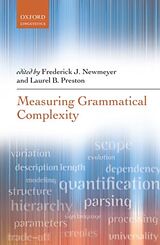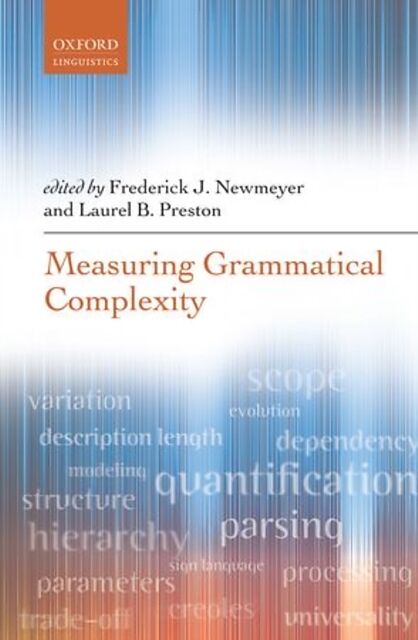Measuring Grammatical Complexity
Einband:
Fester Einband
EAN:
9780199685301
Genre:
Linguistics & Literature
Autor:
Frederick J. (Professor Emeritus, Profes Newmeyer
Herausgeber:
OUP Oxford
Erscheinungsdatum:
30.10.2014
Informationen zum Autor Frederick J. Newmeyer specializes in syntax and the history of linguistics and has as his current research program the attempt to synthesize the results of formal and functional linguistics. He was Secretary-Treasurer of the Linguistic Society of America (LSA) from 1989 to 1994 and its President in 2002. He has been elected Fellow of the LSA and the American Association for the Advancement of Science. In 2011 he received a Mellon Foundation Fellowship for Emeritus Faculty.Laurel B. Preston is a PhD candidate in the Department of Linguistics at the University of Washington, Seattle. Her research interests include temporal semantics, with particular attention to the temporal interpretation of nouns, and adult second language acquisition. Her current work investigates poverty-of-the-stimulus problems in second language acquisition. Klappentext This book examines the question of whether languages can differ in grammatical complexity and, if so, how relative complexity differences might be measured. Chapters approach the question from the point of view of formal grammatical theory, psycholinguistics, and neurolinguistics, and take phonology, morphology, syntax, and semantics into account Zusammenfassung This book examines the question of whether languages can differ in grammatical complexity and, if so, how relative complexity differences might be measured. Chapters approach the question from the point of view of formal grammatical theory, psycholinguistics, and neurolinguistics, and take phonology, morphology, syntax, and semantics into account Inhaltsverzeichnis 1: Frederick J. Newmeyer and Laurel B. Preston: Introduction 2: John A. Hawkins: Major Contributions from Formal Linguistics to the complexity Debate 3: David Gil: Sign languages, Creoles, and the Development of Predication 4: Ray Jackendoff and Eva Wittenberg: What You Can Say Without Syntax: A hierarchy of grammatical complexity 5: Ljiljana Progovac: Degrees of Complexity in Syntax: A view from evolution 6: Theresa Biberauer, Ian Roberts, Michelle Sheehan, and Anders Holmberg: Complexity in comparative Syntax: The view from modern parametric theory 7: Andreas Trotzke and Jan-Wouter Zwart: The Complexity of Narrow Syntax: Minimalism, representational economy, and simplest merge 8: Peter W. Culicover: Constructions, Complexity, and Word Order Variation 9: Kaius Sinnemäki: Complexity Trade-offs: A case study 10: Daniel Ross: The Importance of Exhaustive Description in Measuring Linguistic Complexity: The case of English try and pseudocoordination 11: Steven Moran and Damián Blasi: Cross-linguistic Comparison of Complexity Measures in Phonological Systems 12: Lisa Matthewson: The Measurement of Semantic Complexity: How to get by if your language lacks generalized quantifiers 13: Cristiano Chesi and ANdrea Moro: Computational Complexity in the Brain 14: Lise Menn and Cecily Jill Duffield: Looking for a 'Gold Standard' to Measure language Complexity: What psycholinguistics and neurolinguistics can (and cannot) offer to formal linguistics References Index ...
Autorentext
Frederick J. Newmeyer specializes in syntax and the history of linguistics and has as his current research program the attempt to synthesize the results of formal and functional linguistics. He was Secretary-Treasurer of the Linguistic Society of America (LSA) from 1989 to 1994 and its President in 2002. He has been elected Fellow of the LSA and the American Association for the Advancement of Science. In 2011 he received a Mellon Foundation Fellowship for Emeritus Faculty. Laurel B. Preston is a PhD candidate in the Department of Linguistics at the University of Washington, Seattle. Her research interests include temporal semantics, with particular attention to the temporal interpretation of nouns, and adult second language acquisition. Her current work investigates poverty-of-the-stimulus problems in second language acquisition.
Klappentext
This book examines the question of whether languages can differ in grammatical complexity and, if so, how relative complexity differences might be measured. Chapters approach the question from the point of view of formal grammatical theory, psycholinguistics, and neurolinguistics, and take phonology, morphology, syntax, and semantics into account
Inhalt
1: Frederick J. Newmeyer and Laurel B. Preston: Introduction
2: John A. Hawkins: Major Contributions from Formal Linguistics to the complexity Debate
3: David Gil: Sign languages, Creoles, and the Development of Predication
4: Ray Jackendoff and Eva Wittenberg: What You Can Say Without Syntax: A hierarchy of grammatical complexity
5: Ljiljana Progovac: Degrees of Complexity in Syntax: A view from evolution
6: Theresa Biberauer, Ian Roberts, Michelle Sheehan, and Anders Holmberg: Complexity in comparative Syntax: The view from modern parametric theory
7: Andreas Trotzke and Jan-Wouter Zwart: The Complexity of Narrow Syntax: Minimalism, representational economy, and simplest merge
8: Peter W. Culicover: Constructions, Complexity, and Word Order Variation
9: Kaius Sinnemäki: Complexity Trade-offs: A case study
10: Daniel Ross: The Importance of Exhaustive Description in Measuring Linguistic Complexity: The case of English try and pseudocoordination
11: Steven Moran and Damián Blasi: Cross-linguistic Comparison of Complexity Measures in Phonological Systems
12: Lisa Matthewson: The Measurement of Semantic Complexity: How to get by if your language lacks generalized quantifiers
13: Cristiano Chesi and ANdrea Moro: Computational Complexity in the Brain
14: Lise Menn and Cecily Jill Duffield: Looking for a 'Gold Standard' to Measure language Complexity: What psycholinguistics and neurolinguistics can (and cannot) offer to formal linguistics
References
Index

Leider konnten wir für diesen Artikel keine Preise ermitteln ...
billigbuch.ch sucht jetzt für Sie die besten Angebote ...
Die aktuellen Verkaufspreise von 6 Onlineshops werden in Realtime abgefragt.
Sie können das gewünschte Produkt anschliessend direkt beim Anbieter Ihrer Wahl bestellen.
Loading...
Die aktuellen Verkaufspreise von 6 Onlineshops werden in Realtime abgefragt.
Sie können das gewünschte Produkt anschliessend direkt beim Anbieter Ihrer Wahl bestellen.
| # | Onlineshop | Preis CHF | Versand CHF | Total CHF | ||
|---|---|---|---|---|---|---|
| 1 | Seller | 0.00 | 0.00 | 0.00 |
